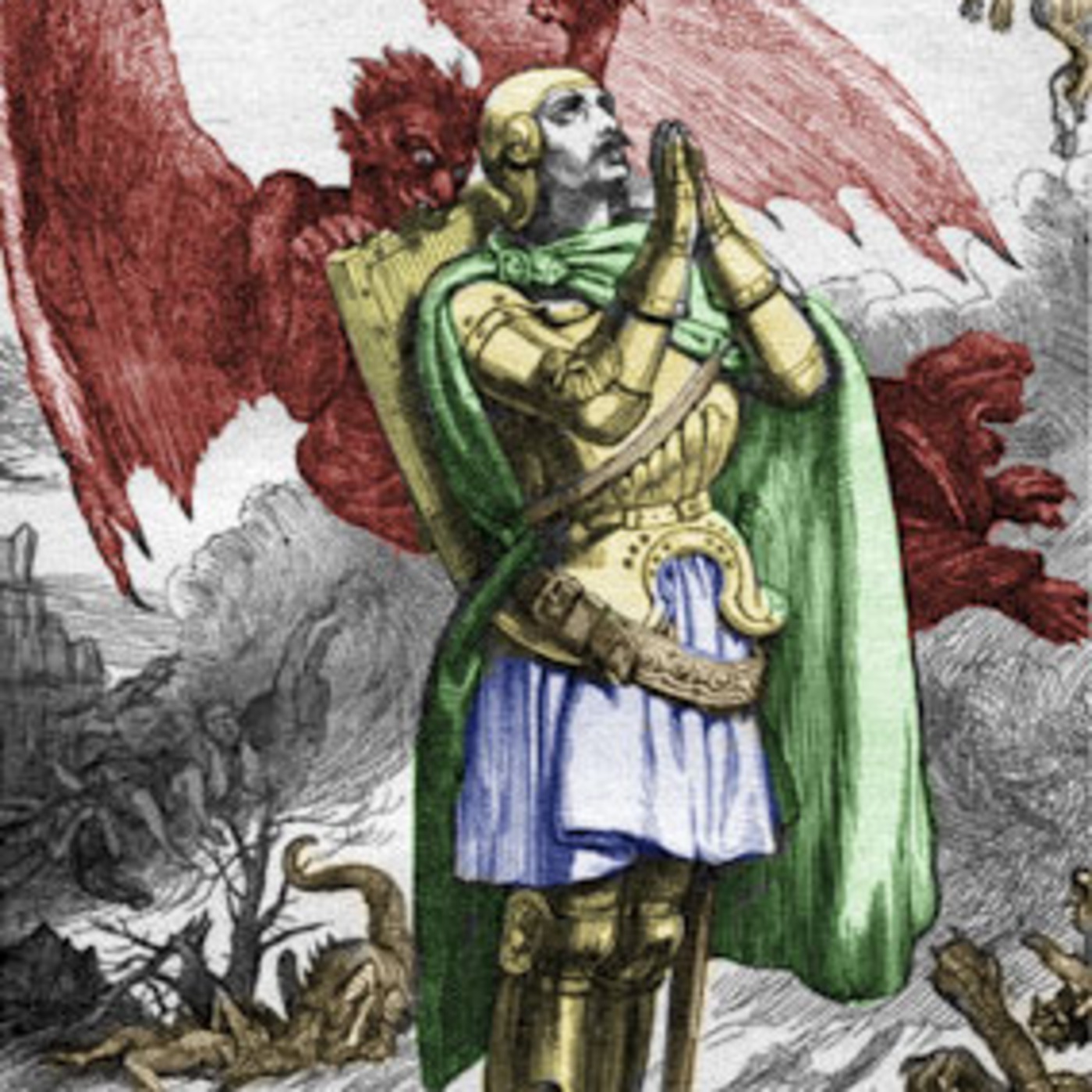 |
Puritan's PodcastPromoting Biblical Reformed Christianity Author: D M
Reformed Theology, Presuppositional Apologetics, Calvinism, Amillenial and Partial Preterist Eschatology, Cessationism regarding revelatory gifts, Absolute predestination and sundry other sound solid Biblical truths for your spiritual health and edification. http://truthforhomer.blogspot.com Language: en-us Genres: Christianity, Religion & Spirituality Contact email: Get it Feed URL: Get it iTunes ID: Get it |
Listen Now...
Keach's Catechism QA 61-118
Saturday, 1 May, 2010
Q. 61. What is forbidden in the third commandment? A. The third commandment forbids all profaning and abusing of any thing whereby God makes Himself known. (Malachi 1:6,7; Lev. 20:3;19:12; Matt. 5:34-37; Isa. 52:5) Q. 62. What is the reason annexed to the third commandment? A. The reason annexed to the third commandment is, that howsoever the breakers of this commandment may escape punishment from men, yet the Lord our God will not suffer them to escape His righteous judgment. (Deut. 28:58,59; Malachi 2:2) Q. 63. Which is the fourth commandment? A. The fourth commandment is, Remember the Sabbath day to keep it holy. Six days shalt thou labor and do all thy work; but the seventh day is the Sabbath of the Lord thy God: in it thou shalt not do any work, thou, nor thy son, nor thy daughter, thy manservant, nor thy maid servant, nor your cattle, nor your stranger who is within thy gates: for in six days the Lord made heaven and earth, the sea, and all that in them is, and rested the seventh day: wherefore the Lord blessed the Sabbath day and hallowed it. (Exodus 20:8-11) Q. 64. What is required in the fourth commandment? A. The fourth commandment requires the keeping holy to God such set times as He has appointed in His Word, expressly one whole day in seven to be a holy Sabbath to Himself. (Lev. 19:30; Deut. 5:12) Q. 65. Which day of the seven has God appointed to be the weekly Sabbath? A. From the creation of the world to the resurrection of Christ, God appointed the seventh day of the week to be the weekly Sabbath; and the first day of the week ever since, to continue to the end of the world, which is the Christian Sabbath. (Gen. 2:3; John 20:19; Acts 20:7; 1 Cor. 16:1,2; Rev. 1:10) Q. 66. How is the Sabbath to be sanctified? A. The Sabbath is to sanctified by a holy resting all that day, even from such worldly employments and recreations as are lawful on other days, and spending the time in the public and private exercises of God's worship, except so much as is to be taken up in the works of necessity and mercy. (Lev. 23:3; Isa. 58:13,14; Isa. 66:23; Matt. 12:11,12) Q. 67. What is forbidden in the fourth commandment? A. The fourth commandment forbids the ommission or careless performance of the duties required, and the profaning the day by idleness, or doing that which is in itself sinful, or by unnecessary thoughts, words, or works, about worldly employments or recreations. (Ezekiel 22:26; 23:38; Jer. 17:21; Neh. 13:15,17; Acts 20:7) Q. 68. What are the reasons annexed to the fourth commandment? A. The reasons annexed to the fourth commandment are, God's allowing us six days of the week for our own employments, His challenging a special propriety in the seventh, His own example and His blessing the Sabbath day. (Exodus 34:21; 31:16,17; Gen. 2:2,3) Q. 69. Which is the fifth commandment? A. The fifth commandment is, "Honor thy father and thy mother, that thy days may be long upon the land which the Lord thy God giveth thee." (Exodus 20:12) Q. 70. What is required in the fifth commandment? A. The fifth commandment requires the preserving the honor, and performing the duties, belonging to every one in their several places and relations, as superiors, inferiors, or equals. (Lev. 19:32; 1 Peter 2:17; Rom. 13:1; Eph. 5:21,22; Eph. 6:1,5,9; Col. 3:19-22; Rom. 12:10) Q. 71. What is forbidden in the fifth commandment? A. The fifth commandment forbids the neglecting of, or doing anything against the honor and duty which belongs to every one in their several places and relations. (Prov. 30:17; Rom. 13:7,8) Q. 72. What is the reason annexed to the fifth commandment? A. The reason annexed to the fifth commandment is a promise of long life and prosperity (as far as it shall serve God's glory and their own good), to all such as keep this commandment. (Eph. 6:2,3; Prov. 4:3-6; 6:20-22) Q. 73. Which is the sixth commandment? A. The sixth commandment is, Thou shalt not kill. (Exodus 20:13) Q. 74. What is required in the sixth commandment? A. The sixth commandment requires all lawful endeavors to preserve our own life and the life of others. (Eph. 5:29,30; Ps. 82:3,4; Prov. 24:11,12; Act 16:28) Q. 75. What is forbidden in the sixth commandment? A. The sixth commandment forbids the taking away our own life, or the life of our neighbor unjustly, or whatsoever tends thereto. (Gen. 4:10,11; 9:6; Matt. 5:21-26) Q. 76. Which is the seventh commandment? A. The seventh commandment is, Thou shalt not commit adultery. (Exodus 20:14) Q. 77. What is required in the seventh commandment? A. The seventh commandment requires the preservation of our own and our neighbor's chastity, in heart, speech, and behavior. (1 Cor. 6:18; 7:2; 2 Tim. 2:22; Matt. 5:28; 1 Peter 3:2) Q. 78. What is forbidden in the seventh commandment? A. The seventh commandment forbids all unchaste thoughts, words, and actions. (Matt. 5:28-32; Job 31:1; Eph. 5:3,4; Rom. 13:13; Col. 4:6) Q. 79. Which is the eighth commandment? A. The eighth commandment is, "Thou shalt not steal." (Exodus 20:15) Q. 80. What is required in the eighth commandment? A. The eighth commandment requires the lawful procuring and furthering the wealth and outward state of ourselves and others. (Prov. 27:23; Lev. 25:35; Deut. 15:10; 22:14) Q. 81. What is forbidden in the eighth commandment? A. The eighth commandment forbids whatsoever does or may unjustly hinder our own or our neighbor's wealth or outward state. (1 Tim. 5:8; Prov. 28:19; 23:20,21; Eph. 4:28) Q. 82. Which is the ninth commandment? A. The ninth commandment is, "Thou shalt not bear false witness against thy neighbor." (Exodus 20:16) Q. 83. What is required in the ninth commandment? A. The ninth commandment requires the maintaining and promoting of truth between man and man, and of our own and our neighbor's good name, especially in witness bearing. (Zech. 8:16; Acts 25:10; Eccles. 7:1; 3 John 12; Prov. 14:5,25) Q. 84. What is forbidden in the ninth commandment? A. The ninth commandment forbids whatsoever is prejudicial to truth, or injurious to our own, or our neighbor's good name. (Eph. 4:25; Ps. 15:3; 2 Cor. 8:20,21) Q. 85. Which is the tenth commandment? A. The tenth commandment is, Thou shalt not covet thy neighbor's house. Thou shalt not covet thy neighbor's wife, nor his man servant, nor his maid servant, nor his ox, nor his ass, nor anything that is thy neighbor's. (Exodus 20:17) Q. 86. What is required in the tenth commandment? A. The tenth commandment requires full contentment with our own condition, with a right and charitable frame of spirit towards our neighbor, and all that is his. (Heb. 13:5;1 Tim. 6:6; Rom. 12:15; 1 Cor. 13:4-7; Lev. 19:18) Q. 87. What is forbidden in the tenth commandment? A. The tenth commandment forbids all discontentment with our own estate, envying or grieving at the good of our neighbor, and all inordinate motions and affections to anything that is his. (1 Cor. 10:10; James 5:9; Gal. 5:26; Col. 3:5) Q. 88. Is any man able perfectly to keep the commandments of God? A. No mere man, since the fall, is able in this life, perfectly to keep the commandments of God, but daily breaks them in thought, word, and deed. (Eccles. 7:20; Gen. 6:5; Gen. 8:21; 1 John 1:8; James 3:8; James 3:2; Rom. 3:23) Q. 89. What then is the purpose of the law since the fall? A. The purpose of the law, since, the fall, is to reveal the perfect righteousness of God, that His people may know his will for their lives and the ungodly, being convicted of their sin, may be restrained therein and brought to Christ for salvation. (Ps. 19:7-11; Rom. 3:20,31; 7:7; 12:2; Titus 2:12-14; Gal. 3:22,24; 1 Tim. 1:8) Q. 90.Are all transgressions of the law equally heinous? A. Some sins in themselves and by reason of several aggravations, are more heinous in the sight of God than others. (Ezekiel 8:13; John 19:11; 1 John 5:16) Q. 91. What does every sin deserve? A. Every sin deserves God's wrath and curse, both in this life, and in that which is to come. (Eph.5:6; Gal. 3:10; Prov. 3:33; Ps. 11:6; Rev. 21:8) Q. 92. What does God require of us, that we may escape His wrath and curse, due to us for sin? A. To escape the wrath and curse of God due to us for sin, God requires of us faith in Jesus Christ, repentance unto life, with the diligent use of all the outward and ordinary means whereby Christ communicates to us the benefits of redemption. (Acts 20:21; Acts 16:30,31; 17:30) Q. 93. What is faith in Jesus Christ? A. Faith in Jesus Christ is a saving grace, whereby we receive and rest upon Him alone for salvation, as He is offered to us in the Gospel. (Heb. 10:39; John 1:12; Phil. 3-9; Gal. 2:15,16) Q. 94. What is repentance unto life? A. Repentance unto life is a saving grace, whereby a sinner, out of a true sense of his sin, and apprehension of the mercy of God in Christ, does, with grief and hatred of his sin, turn from it unto God, with full purpose of, and endeavor after, new obedience. (Acts 2:37; Joel 2:13; Jer. 31:18,19: 2 Cor. 7:10,11; Rom. 6:18) Q. 95. What are the outward and ordinary means whereby Christ communicates to us the benefits of redemption? A. The outward and ordinary means whereby Christ communicates to us the benefits of redemption are His ordinances, especially the Word, Baptism, the Lord's Supper and Prayer; all which are made effectual to the elect for salvation. (Rom. 10:17; James 1:18; 1 Cor. 3:5; Acts 14:1; 2:41,42) Q. 96. How is the Word made effectual to salvation? A. The Spirit of God makes the reading, but especially the preaching of the Word an effectual means of convincing and converting sinners, and of building them up in holiness and comfort, through faith unto salvation. (Ps. 119:11,18; 1 Thess. 1:6; 1 Peter 2:1,2; Rom. 1:16; Ps. 19:7) Q. 97. How is the Word to be read and heard that it may become effectual to salvation? A. That the Word may become effectual to salvation we must attend thereunto with diligence, preparation and prayer, receive it in faith and love, lay it up in our hearts and practice it in our lives. (Prov. 8:34; 1 Peter 2:1,2; 1 Tim. 4:13; Heb. 2:1,3; Heb. 4:2; 2 Thess. 2:10; Ps. 119:11; James 1:21,25) Q. 98. How do Baptism and the Lord's Supper become effectual means of salvation? A. Baptism and the Lord's Supper become effectual means of salvation, not from any virtue in them or in him that administers them, but only by the blessing of Christ and the working of His Spirit in them that by faith receive them. (1 Peter 3:21; 1 Cor. 3:6,7; 1 Cor. 12:13) Q. 99. Wherein do Baptism and the Lord's Supper differ from the other ordinances of God? A. Baptism and the Lord's Supper differ from the other ordinances of God in that they were specially instituted by Christ to represent and apply to believers the benefits of the new covenant by visible and outward signs. (Matt. 28:19; Acts 22:16; Matt. 26:26-28; Rom. 6:4) Q. 100. What is Baptism? A. Baptism is an holy ordinance, wherein the washing with water in the name of the Father, the Son and the Holy Spirit, signifies our ingrafting into Christ and partaking of the benefits of the covenant of grace, and our engagement to be the Lord's. (Matt. 28:19; Rom. 6:3-5; Col. 2:12; Gal. 3:27) Q. 101. To whom is Baptism to be administered? A. Baptism is to be administered to all those who actually profess repentance towards God, faith in, and obedience to our Lord Jesus Christ; and to none other. (Acts 2:38; Matt. 3:6; Mark 16:16; Acts 8:12,36; Acts 10:47,48) Q. 102. Are the infants of such as are professing believers to be baptized? A. The infants of such as are professing believers are not to be baptized; because there is neither command nor example in the Holy Scriptures, or certain consequence from them, to baptize such. Q. 103. How is Baptism rightly administered? A. Baptism is rightly administered by immersion, or dipping the whole body of the person in water, in the name of the Father, and of the Son, and of the Holy Spirit. (Matt. 3:16; John 3:23; Acts 8:38,39) Q. 104. What is the duty of those who are rightly baptized? A. It is the duty of those who are rightly baptized to give up (join) themselves to some visible and orderly church of Jesus Christ, that they may walk in all the commandments and ordinances of the Lord blameless. (Acts 2:46,47; Acts 9:26; 1 Peter 2:5; Heb. 10:25; Rom. 16:5) Q. 105. What is the visible church? A. The visible church is the organized society of professing believers, in all ages and places, wherein the Gospel is truly preached and the ordinances of Baptism and the Lord's Supper rightly administered. (Acts 2:42; 20:7; Acts 7:38; Eph. 4:11,12) Q. 106. What is the invisible church? A. The invisible church is the whole number of the elect, that have been, are, or shall be gathered into one under Christ the head. (Eph. 1:10; 1:22,23; John 10:16; 11:52) Q. 107. What is the Lord's Supper? A. The Lord's Supper is a holy ordinance, wherein, by giving and receiving bread and wine, according to Christ's appointment, His death is showed forth, and the worthy receivers are, not after a corporeal and carnal manner, but by faith, made partakers of His body and blood, with all His benefits, to their spiritual nourishment, and growth in grace. (1 Cor. 11:23-26; 10:16) Q. 108. What is required to the worthy receiving of the Lord's Supper? A. It is required of them that would worthily (that is, suitably) partake of the Lord's Supper, that they examine themselves, of their knowledge to discern the Lord's body; of their faith to feed upon Him; of their repentance, love, and new obedience: lest, coming unworthily, they eat and drink judgment to themselves. (1 Cor. 11:27-31; 1 Cor. 5:8; 2 Cor. 13:5) Q. 109. What is Prayer? A. Prayer is an offering up of our desires to God, for things agreeable to His will, in the name of Christ, with confession of our sins and thankful acknowledgment of His mercies. (1 John 5:14; 1 John 1:9; Phil. 4:6; Ps. 10:17; 145:19; John 14:13,14) Q. 110. What rule has God given for our direction in prayer? A. The whole Word of God is of use to direct us in prayer, but the special rule of direction is that prayer, which Christ taught His disciples, commonly called the Lord's Prayer. (Matt. 6:9-13; 2 Tim. 3:16,17) Q. 111. What does the preface of the Lord's Prayer teach us? A. The preface of the Lord's Prayer, which is, Our Father, which art in heaven, teaches us to draw near to God, with all holy reverence and confidence, as children to a father, able and ready to help us, and that we should pray with and for others. (Matt. 6:9; Luke 11:13; Rom. 8:15; Acts 12:5; 1 Tim. 2:1-3) Q. 112. What do we pray for in the first petition? A. In the first petition, which is "Hallowed be thy name," we pray that God would enable us and others to glorify Him in all that whereby He makes Himself known, and that He would dispose all things to His own glory. (Matt. 6:9; Ps. 67:1-3; Rom. 11:36; Rev. 4:11) Q. 113. What do we pray for in the second petition? A. In the second petition, which is "Thy kingdom come," we pray that satan's kingdom may be destroyed, and that the kingdom of grace may be advanced; ourselves and others brought into it, and kept in it, and that the kingdom of glory may be hastened. (Matt. 6:10; Ps. 68:1-18; Rom. 10:1; 2 Thess. 3:1; Matt. 9:37,38; Rev. 22:20) Q. 114. What do we pray for in the third petition? A. In the third petition, which is, "Thy will be done in earth as it is in heaven," we pray that God by His grace, would make us able and willing to know, obey, and submit to His will in all things, as the angels do in heaven. (Matt. 6:10; Ps. 103:20,21; Ps. 25:4,5; Ps. 119:26) Q. 115. What do we pray for in the fourth petition? A. In the fourth petition, which is, Give us this day our daily bread, we pray that of God's free gift, we may receive a competent portion of the good things of this life and enjoy His blessing with them. (Matt. 6:11; Prov. 30:8,9; 1 Tim. 6:6-8; 4:4,5) Q. 116. What do we pray for in the fifth petition? A. In the fifth petition, which is, "And forgive us our debts, as we forgive our debtors," we pray that God, for Christ's sake, would freely pardon all our sins; which we are the rather encouraged to ask, because by His grace we are enabled from the heart to forgive others. (Matt. 6:12; Ps. 51:1,3,7; Mark 11:25; Matt. 18:35) Q. 117. What do we pray for in the sixth petition? A. In the sixth petition, which is, "And lead us not into temptation, but deliver us from evil," we pray that God would either keep us from being tempted to sin, or support and deliver us when we are tempted. (Matt. 6:13; 26:41; Ps. 19:13; 1 Cor. 10:13; John 17:15) Q. 118. What does the conclusion of the Lord's Prayer teach us? A. The conclusion of the Lord's Prayer, which is, For thine is the kingdom, and the power, and the glory, forever, Amen, teaches us to take our encouragement in prayer from God only, and in our prayers to praise Him, ascribing kingdom, power, and glory to Him; and in testimony of our desire, and assurance to be heard, we say, AMEN. (Matt. 6:13; Dan. 9:18,19; 1 Chron. 29:11-13; 1Cor. 14:16; Phil. 4:6; Rev. 22:20) http://truthforhomer.blogspot.com





